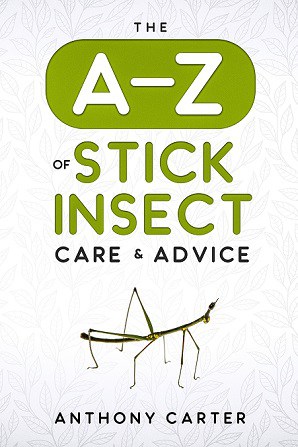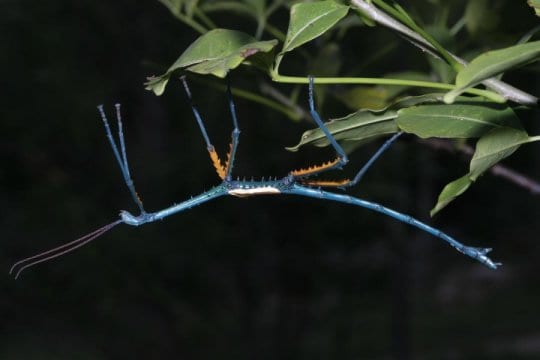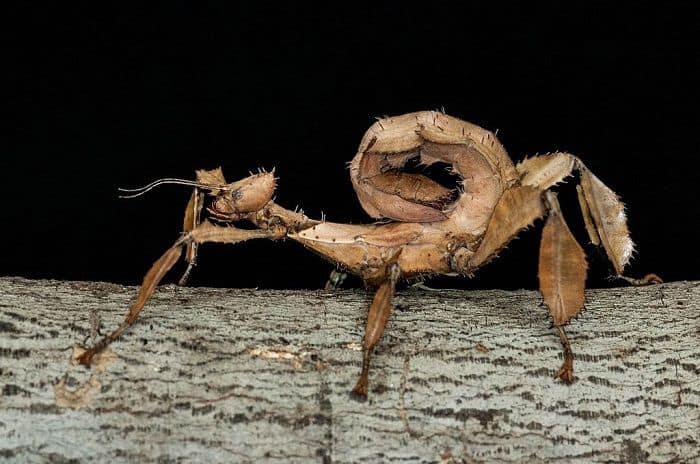Table of Contents
One of the strangest questions stick insect keepers get is this: are stick insects cannibalistic? Perhaps it is the fact that some stick insect species look so barbaric that causes people to wonder about their potential for cannibalism. Fortunately, the answer is…
No, stick insects are not cannibalistic. Stick insects are herbivores, which means they live solely on plant life (more specifically, leaves). A stick insect could not eat another one even if it wanted to because its mandible anatomy will just not allow it. Stick insects do not have the biological tools to be carnivores.
This is not to say that stick insects will not kill one another. Though violence is not normally their nature, if you put too many stick insects in a small enclosure, they could turn on one another simply because there’s not enough room. Also note there are a small number of stick insect species that simply refuse to live with others. They might resort to violence in order to protect their territory.
We say all that to say this: on the rare occasion that stick insects do resort to violence, it is not a matter of eating one another . They only seek to protect their territory.
. They only seek to protect their territory.
For more advice and information on keeping and looking after stick insects, check out my ebook on Amazon click here
(opens in a new tab).

Moulting in the Wild
Perhaps one of the reasons some people believe stick insects are cannibalistic has something to do with moulting. A stick insect can moult as many as half-a-dozen times from hatching through full adult maturity. Nymphs are known to eat their shed skins in the wild. Why would they practice such bizarre behaviour?
as many as half-a-dozen times from hatching through full adult maturity. Nymphs are known to eat their shed skins in the wild. Why would they practice such bizarre behaviour?
Nymphs are especially vulnerable to predators because their bodies have not yet fully matured. Moulted skin hanging from a branch makes matters worse by telling predators there is a nymph around. So as a matter of self-preservation, the nymphs of many species will eat their moulted skin immediately after shedding it.
This behaviour might lead some people to believe that stick insects are cannibalistic. But they are not. Eating shed skin is one thing, but eating another insect is entirely different. Remember, stick insects do not have the biological tools to do that.
More Common Than You Think
Although stick insects are not cannibalistic, cannibalism in nature is actually more common than you might think. In the insect world, both the praying mantis and the Australian red back spider are well known cannibals. The males of both species are eaten by females immediately after mating.
Some bird species eat hatchlings when conditions are right. For example, gulls and pelicans are known to eat hatchlings when other food sources are not readily available. They sometimes eat their young in order to prevent the spread of disease too.
Farther up the food chain, there are even large mammals known to eat their young. Bears and lions are both known to eat the offspring of females within their groups in order to encourage more mating. As cruel and bizarre as that might seem, is a normal part of the animal kingdom.
Even chimpanzees are known to be cannibalistic. When cannibalism occurs in a chimpanzee group, it is usually the case of an adult male killing and eating potential rivals. They go after younger chimpanzees they perceive could be a threat at some point down the road.

Stick Insects Love Plants
That’s enough talk about other species; let’s get back to the question, “are stick insects cannibalistic?” Again, the answer is ‘no’, stick insects only eat plant leaves (and very occasionally stems). Typical food sources include plant leaves like bramble, privet, and ivy. Some stick insects will eat virtually any leaf you give them while others are a bit more choosy.
you give them while others are a bit more choosy.
You might be interested to note that it is not necessary to feed stick insects both plants and water separately. Some pet owners put plant leaves in water so as to preserve them, but it is really not necessary. Stick insects get all the water they need from the leaves themselves.
from the leaves themselves.
We will close this post by warning readers not to believe claims that stick insects will cannibalise one another if there is insufficient plant life to sustain them. It is not true. Remember the old adage that you cannot believe everything you read online. Stick insects are herbivores through and through. If there is insufficient plant life, they will starve to death. Stick insects will not cannibalise one another.

